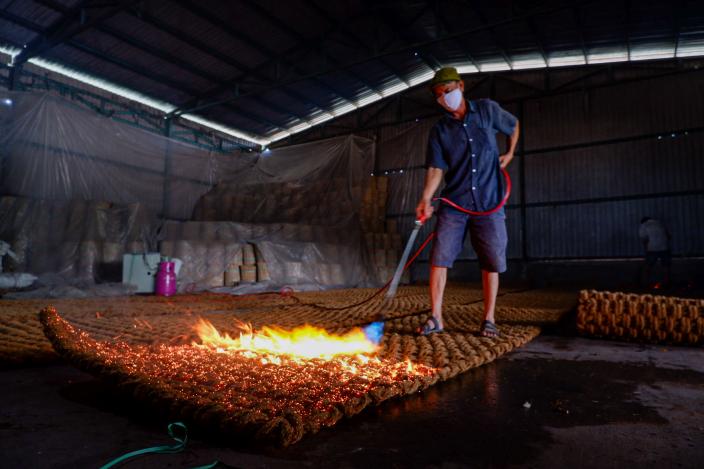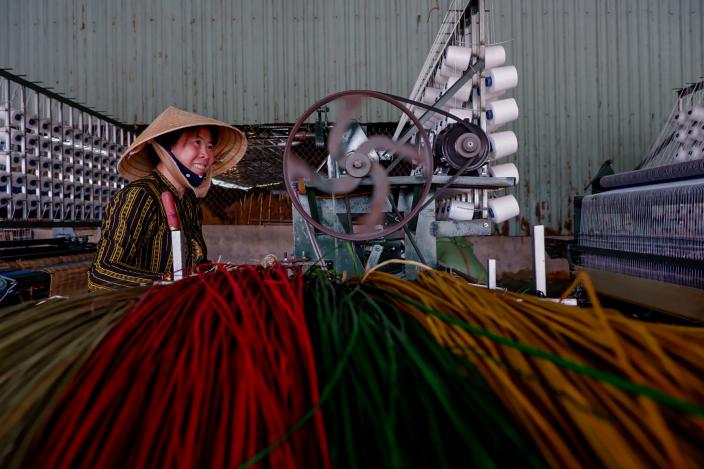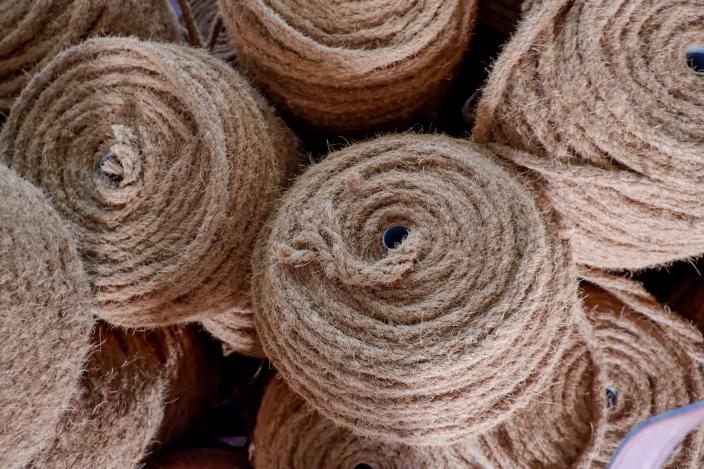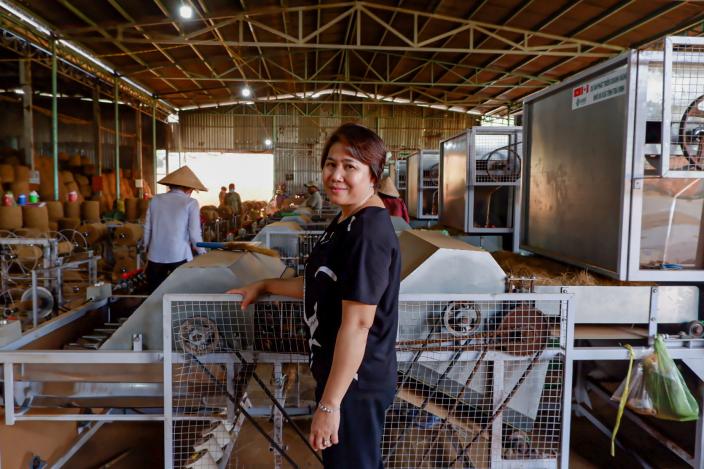“Thuy, who dropped out of school at 13 and liked to describe herself as someone who does not have much of an education, said that was the first time she received proper training to run a business.”
Every year Nguyen Thi Kim Thuy looks forward to the cherry blossom season in South Korea. It is not because she enjoys it; in fact, the Mekong Delta-born business-owner has never been to one. But her hand-woven products, thick coir mats and slimmer sedge mats, have. And, as she has been told by clients, they even play a crucial part in it.
The “coconut carpets,” as Thuy calls them, blanket outdoor walkways in the natural tourist attractions to save flower watchers from slipping on ice brought by March snow, while the pale mats are wrapped around tree trunks to shield them from damaging cold.
“A few months prior to the festival, the demand always surges,” Thuy said, sitting in her workshop perched by the lazy Cai Hop river in Tra Vinh province.
In South Korea, the coir mat rolls – the staple of her business – offer a soft and durable alternative to sanding and salt spreading, and an environmentally friendly replacement for other PVC road matting. Back in Tra Vinh, it provides good-paying jobs for a few hundred local farmers, a majority of whom are women, in the most poverty-stricken province of the Mekong Delta.
In the eyes of outsiders, the value of a coconut lies in the nut – the glassy juice surrounded by the milky pulp, both of which are usually served as a refreshment or processed into ingredients of skin care products. But to Kim Thuy, known to everyone around her as either Aunty Thuy or Ut – meaning the youngest child in the family – it is the rugged fibrous husk that has helped her build the business named Ut Mung for the past two decades.
Stepping into the trade in 2001, Thuy and her then husband at first simply bought the rinds and extracted the fiber before selling blocks of it to processing plants in the country’s coconut hub of Ben Tre province. While Tra Vinh, her homeland, is abundant with them– its output is second only to its Mekong Delta neighbour – the palms had hardly been considered the community’s cash cow. The locals for generations instead lived off their rice fields, and sometimes earned a little extra money when small traders came to their backyard gardens with a hook knife in hand, harvesting and buying the fruits at a cheap price. During boat trips to transport the material to the manufacturers, the couple decided it was worth climbing further in the supply chain. They learned the art of coir rope making, and then coir mat weaving over the years. Now, the family-run business has grown into an exporting company, pushing out 20 containers of coconut carpets a year to various countries, especially South Korea.

The makings of coconut carpets
It was not always smooth sailing. The roughest patch and also the breakthrough on the journey happened in 2017, when Thuy and her husband split. “In one year, I coped with the divorce, shouldered the debt he left on me, while the business ran into deadlocks as the coconut trade shook due to the previous major drought in the Mekong Delta,” Thuy recalled. But that was also when she met with new clients from South Korea, who from then on decided to order directly from Ut Mung instead of through intermediaries. Her company was introduced to SME funding sources that helped expand the coconut business further. “And I joined a program called EFD that year, too,” she added.
Thuy, who dropped out of school at 13 and liked to describe herself as someone who does not “have much of an education,” said that was the first time she received proper training to run a business. “I was born a farmer; I can endure hardship and all,” the 51-year-old owner said, “but at the time I could hardly draw out what they called a strategy, or have an idea of what the company’s mission was.” And she did not know anything of “computer or computee,” and kept track of everything by writing down notes. “Consultants from the program when visiting us were appalled at my sketchy records,” Thuy said with a big laugh. “They wondered how I had not run into troubles.” The teachers, as she called them, spent days showing Thuy how to keep sheets of her data neatly with digital programs, and pointing out to her where her business’s advantages and weaknesses lie, what are the risks involved, and where money “leaks” could be before building a development strategy. “I count myself a slow learner, but whatever I absorb I would never forget,” she concluded of “the best training course” she has ever attended. “From there I started to pull myself, and my business as well, together.”
Ut Mung is currently running on an army of 200 local workers. Half of them work from home, either making coir ropes or processing and dying the sedge. The other half spend their time under the tin-roofed workshop cluster, which recently expanded into a 10,000m2 facility.

Local worker in Ut Mung's facility
Around 5am on a cool, breezy day at the end of the year, the clamorous facility was already up and buzzing. Two conveyor belts were quietly pushed to the riverbank, where five boats with piles of coconut husks on top were docked. A group of 10 chattering people lined up on the sides of the long machines and started putting the shells onto the vibrating belt, which delivered them to fibre shredders nearby. One of the “loaders,” Bay Anh, stood first in line. This is one of the few jobs around where she can work with her husband, she said, who was also on the team. “Two people working [in a family] is always better than one,” she added. “Women here don’t mind having their hands real busy, but there are not so many things for us to do that can yield such decent incomes.”
Her final words were quickly drowned out by a rumbling noise as another team a few feet behind her turned on the shedder. A pair of brown-skin coconut shells that a few seconds ago flew out of Bay Anh’s hands onto the moving black band fell into the square mouth of a dusty, blue-painted fibre extractor. On the side of the steel machine, which somewhat resembles a concrete mixer, churned out an endless stream of light brown coir. A few women surrounding it took turns to pull out bulk of the fibres and thrust them all into a square wooden box before one of them hopped up and stamped her feet on top, compressing the material into a furry block. Next to them, two older men collected the grainy coco peat gushing out of a machine tube into red sacks. The packs would later be sold to flower growers as potting material, while those assembled by the women’s team were quickly carted to a newly-built red-brick section of the complex.
Inside were two rows of automated twine makers, 20 in total, where the fine filaments were fed in and spun into rolls of coir threads. Thuy was particularly proud of the newest addition to the business. “Before we employed much smaller machines. At best they could process only 100kg of fibre a day, while these guys,” Thuy said as she stood next to one of them, “could speed up to 500kg a day, with more consistent quality and less glitches.” The big investment was possible partially thanks to a SME supporting program, and Thuy put in nearly VND2 billion. “I have to,” she said, “our competitors are upping their game, too.” Besides, she could hire older labourers for the monitoring job. “The machines are not so hard to use while requiring less muscle. Women above 50 can just sit at the side to make sure they run smoothly.”
Thuy sells a small portion of the coir rolls to manufacturers in the delta and a few Asian neighbours. But most of them are kept to be woven into coconut walkway mats for export. It takes a pair of workers to create a standard eight-metre-long product, and they are usually from the same family in the community. “It is easier to split the money; no quarrel ensues,” said a weaver named Nhi. Before teaming up with his wife, Van, in the facility for the last few years, he used to work alone in their family’s rice field, and sometimes was hired as a boat fixer, but “we hardly made ends meet.” With this job both of them can work and earn a good sum: during rush months, the couple together can pocket up to VND900,000 a day. “That is big money in this area,” Van said. “We are paid by product, there is no working hour here,” Nhi added, “so we can tend our paddy field or join the weddings of relatives for days and come back to weaving any time.”
But the workshop has become less crowded since Covid-19. “Orders have slashed by half,” Kim Thuy said. “Earlier in 2020, when the first outbreak hit, I could send through only 16 containers of my carpets, and three of them have been stuck for the rest of the year.” While storage was not a concern, as the material of dry fibres can be kept year-round without being rotten or attacked by bugs, maintaining the workflow to keep these experienced workers has been an issue. Thuy has managed the situation by still letting them work, although at a slower rate, and seeking ways to break into the domestic market.

She also began to expand her product lines, as the company has just bought eight sedge mat weaving machines. “I met a mat manufacturer and exporter in Dong Thap province,” she said, “who has been struggling to keep up with orders flocking in from Thailand and Myanmar. My company in the coastal region sits right in the middle of two major sedge growing fields, so he asked me to join his supply.” The recent business partnership was sprouted during one of the trade promotion trips Ut Mung was selected to attend, where small and medium enterprises from various provinces are introduced to each other for potential collaborations. As a strategy to stay afloat when Covid-19 lingered, Thuy hired a group of local women to work on the new project, and her partner would take care of the output. “We have been in operation for two months, and so far it is so good,” she said.
Thuy expected the effects of the pandemic would be over soon, and the exporting route would quickly be resumed. The Mekong Delta business woman has readied her products for the cherry blossom months, March and April, in her client’s country, which she hoped would kick start a rebound from 2020. “Since I got involved in the coconut trade, I have reached rock bottom several times,” Thuy said when asked about the risks that might lie ahead. “I don’t mind setbacks or failures. At least I would not have to live with regrets, knowing I have done everything I could.”
Phuong Nhung
Read more here
